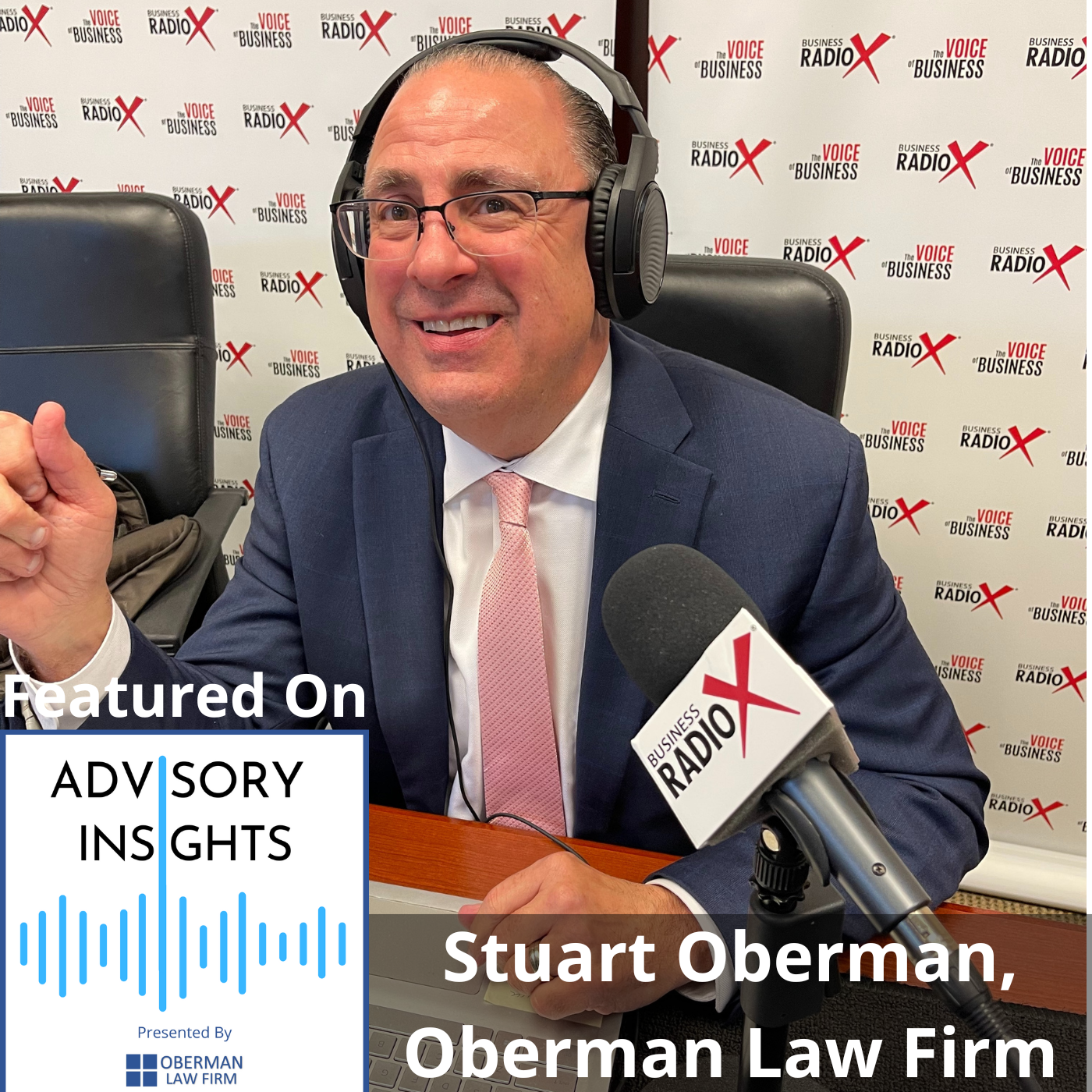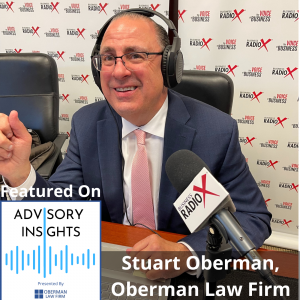
Overview of Pregnancy Accommodations (Advisory Insights Podcast, Episode 9)
Are you an employer who needs to accommodate a pregnant employee? Then this episode of Advisory Insights is for you! Stuart Oberman from Oberman Law Firm shared relevant laws, such as the Pregnancy Discrimination Act, the Family Medical Leave Act, and the Americans with Disabilities Act. Stuart also discussed EEOC guidelines on how to treat employees who are temporarily unable to perform their duties due to pregnancy or other medical conditions, and he shared a reminder that employers cannot discriminate against an employee who is pregnant.
Advisory Insights is presented by Oberman Law Firm and produced by the North Fulton studio of Business RadioX®. The series can be found on all the major podcast apps. You can find the complete show archive here.
TRANSCRIPT
Intro: [00:00:01] Broadcasting from the studios of Business RadioX, it’s time for Advisory Insights. Brought to you by Oberman Law Firm, serving clients nationwide with tailored service and exceptional results. Now, here’s your host.
Stuart Oberman: [00:00:20] And welcome everyone. Stuart Oberman here. Welcome to Advisory Insights. I want to talk about an issue that we run into a lot of questions on, whether it is through our webinars, whether through our podcasts, whether it’s through our speaking, or just on our clients on a national basis. So, for those that have listened before, we have clients in about 35 to 40 states and we represent small, medium, large global companies, small company startups.
Stuart Oberman: [00:00:54] And there’s a resounding question of this particular topic, which is regarding pregnancy accommodations. “What do I do? How do I handle this? I’ve got a great employee. I want to make sure that I’m doing this right. I respect them. I want to make every accommodation possible, but I don’t know what to do.”
Stuart Oberman: [00:01:17] Well, let me give you a little bit of background here and some information. Keep in mind that every situation is different. Every employment situation is different, whether you are in a business environment, whether you are working remote, whether you are working in a health care office, one of our dental offices, one of our veterinary offices for our clients. So, every situation is different. I’ll give you a little bit of 10,000 foot view. And then, again, at the end, if you have any questions, we’ll relay how to get a hold of us.
Stuart Oberman: [00:01:57] So, you know, what do you do when you have an employee that is pregnant? And we frequently get this from H.R. professionals, how do we handle accommodation requests? Well, first and foremost, they are covered depending on the circumstances. For employees that are pregnant, there is a Federal Law, the Pregnancy Discrimination Act, you’ve got the Family Medical Leave Act, and American with Disabilities Act.
Stuart Oberman: [00:02:26] So, first and foremost, when you get those questions, you have to go immediately and review those particular laws, again, the Pregnancy Discrimination Act, the Family Medical Leave Act, and Americans with Disabilities Act. That’s your starting point.
Stuart Oberman: [00:02:42] If you don’t know the answer right off hand, right off the bat, I would urge you, urge you, urge you get advice on counsel because you’re potentially playing with fire. And one area we need to take a look at is there’s been a lot of guidance from the EEOC, and they’ve come up with a whole diatribe of different things you can do and and how you treat employees who are temporarily unable to perform the functions while they’re pregnant or medical conditions. So, you got some guidance from the EEOC.
Stuart Oberman: [00:03:17] But let me give you this bullet point, the silver bullet, bottom line, bottom line is, employers, you cannot discriminate against an employee who is pregnant, period, bottom line. So, you have to take a look at if an employee meets the Family Medical Leave requirements eligibility. There are some cases where that particular employee may very well be entitled to 12 weeks of unpaid leave in a 12 month period, whether it’s full or part-time.
Stuart Oberman: [00:03:50] So, the one particular note is the Family Medical Leave Act does not require you as an employer to provide an employee with light duty work. So, again, you have to look at the circumstances. You have to look at the accommodations. You have to look at the job description. What is that employee doing?
Stuart Oberman: [00:04:14] So, one thing that we also want to take a look at under the ADA, American with Disabilities Act, is that the employee must have or, in some cases, regarded as having a physical or mental impairment that substantially limits one or more of the “life activities”. So, that is so broad that I would urge you not to self-interpret that, but take a look at the facts and circumstances and make sure that you are under proper guidance.
Stuart Oberman: [00:04:52] And I would document everything. If you have an employee who is pregnant and needs – I’ll use the words – special assistance, accommodations, curtailments, please have, please, please have a written procedure for this, a written request for the accommodation.
Stuart Oberman: [00:05:14] Now, I will tell you that there are some cases, not every employee is going to apply under state or federal local law. So, if you say, “Well, look. I don’t have to do anything. I don’t have any disregard for the federal, state, or local law. I’m not under any compliance. I’m going to do what I want.” Yes, that is true to a certain extent. But you’ve got to take a look at the whole picture. Is it a good employee? Do you want them back? Are you going to discharge them? Are you having trouble with that employee period even before they became pregnant and expecting? So, now you got a whole nother set of issues to document. I would always say that no matter what the employee is doing, the condition, skill level, you’ve got to document everything.
Stuart Oberman: [00:06:08] So, again, if the employee does not fall within the guidelines under state, federal, local law, and he may not, you, as employer, have the determination as to what extent you want to accommodate that employee. But I would urge you to seek guidance on that.
Stuart Oberman: [00:06:24] Now, remember, if you have an employee who’s expecting, it is not necessary that they use the word “accommodation we’re making a request to you.” They could say “I need” or “I want help with” or “I desire” or “because of my pregnancy, I can’t do this”. Just because they say, “You know what? you didn’t use the word accommodation.” It doesn’t matter. There’s different ways to ask for assistance on different things and you’ve got to be cognizant of that.
Stuart Oberman: [00:06:59] So, encourage your employees to be interactive with their expectations on you. Determine what they need, how they need it, what they need it, is it going to cost you a fortune or is it going to cost you a little for that accommodation, that request, that desire from the employee.
Stuart Oberman: [00:07:15] So, again, document it, put it in writing, have that request up to date, and always review everything you do on a daily basis, especially with employees that are asking for reasonable accommodations.
Stuart Oberman: [00:07:31] Folks, it’s a very, very complex question. I know we’re only covering this topic in a couple of minutes. I could speak probably three hours on this particular topic. But, again, top of mind, if you have these matters, look at them, address them, be smart what you do, seek counsel and guidance. Do not just fly off the handle and say no as soon as the request comes in.
Stuart Oberman: [00:07:55] So, folks, thank you for joining Advisory Insights. Stuart Oberman here as your host. If you want to get a hold of us, please give us a call, 770-886-2400 or email me at stuart, S-T-U-A-R-T, @obermanlaw.com. Folks, thank you for joining us. Hopefully, you took one or two things away from this particular topic. And we’ll look forward to seeing you on other podcasts of Advisory Insights. Have a great day.
Outro: [00:08:22] Thank you for joining us on Advisory Insights. This show is brought to you by Oberman Law Firm, a business-centric law firm representing local, regional, and national clients in a wide range of practice areas, including health care, mergers and acquisitions, corporate transactions, and regulatory compliance.
About Advisory Insights Podcast
Presented by Oberman Law Firm, Advisory Insights Podcast covers legal, business, HR, and other topics of vital concern to healthcare practices and other business owners. This show series can be found here as well as on all the major podcast apps.
Stuart Oberman, Oberman Law Firm

Stuart Oberman is the founder and President of Oberman Law Firm. Mr. Oberman graduated from Urbana University and received his law degree from John Marshall Law School. Mr. Oberman has been practicing law for over 25 years, and before going into private practice, Mr. Oberman was in-house counsel for a Fortune 500 Company. Mr. Oberman is widely regarded as the go-to attorney in the area of Dental Law, which includes DSO formation, corporate business structures, mergers and acquisitions, regulatory compliance, advertising regulations, HIPAA, Compliance, and employment law regulations that affect dental practices.
In addition, Mr. Oberman’s expertise in the healthcare industry includes advising clients in the complex regulatory landscape as it relates to telehealth and telemedicine, including compliance of corporate structures, third-party reimbursement, contract negotiations, technology, health care fraud, and abuse law (Anti-Kickback Statute and the State Law), professional liability risk management, federal and state regulations.
As the long-term care industry evolves, Mr. Oberman has the knowledge and experience to guide clients in the long-term care sector with respect to corporate and regulatory matters, assisted living facilities, continuing care retirement communities (CCRCs). In addition, Mr. Oberman’s practice also focuses on health care facility acquisitions and other changes of ownership, as well as related licensure and Medicare/Medicaid certification matters, CCRC registrations, long-term care/skilled nursing facility management, operating agreements, assisted living licensure matters, and health care joint ventures.
In addition to his expertise in the health care industry, Mr. Oberman has a nationwide practice that focuses on all facets of contractual disputes, including corporate governance, fiduciary duty, trade secrets, unfair competition, covenants not to compete, trademark and copyright infringement, fraud, and deceptive trade practices, and other business-related matters. Mr. Oberman also represents clients throughout the United States in a wide range of practice areas, including mergers & acquisitions, partnership agreements, commercial real estate, entity formation, employment law, commercial leasing, intellectual property, and HIPAA/OSHA compliance.
Mr. Oberman is a national lecturer and has published articles in the U.S. and Canada.
Oberman Law Firm
Oberman Law Firm has a long history of civic service, noted national, regional, and local clients, and stands among the Southeast’s eminent and fast-growing full-service law firms. Oberman Law Firm’s areas of practice include Business Planning, Commercial & Technology Transactions, Corporate, Employment & Labor, Estate Planning, Health Care, Intellectual Property, Litigation, Privacy & Data Security, and Real Estate.
By meeting their client’s goals and becoming a trusted partner and advocate for our clients, their attorneys are recognized as legal go-getters who provide value-added service. Their attorneys understand that in a rapidly changing legal market, clients have new expectations, constantly evolving choices, and operate in an environment of heightened reputational and commercial risk.
Oberman Law Firm’s strength is its ability to solve complex legal problems by collaborating across borders and practice areas.
Connect with Oberman Law Firm:
Company website | LinkedIn | Twitter
















